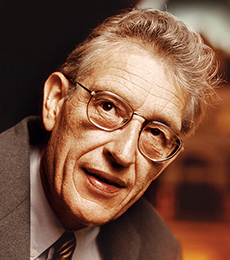The poet Irving Layton once defined a Canadian as someone who keeps asking: “what is a Canadian?” If so, the distinguished political science professor Richard Simeon was as Canadian as they come.
Simeon, who died of cancer last October at the age of 70, was a scholar of federalism who acted as a key adviser during this country’s great era of constitution-building in the 1980s and early 1990s. His sensitivity to the need for reconciling competing claims of different groups made him, in the phrase of his colleagues, an expert “bridge-builder.” Fair, inclusive, curious and tolerant: these were words often used to describe an academic whose expertise on negotiating consensus was regularly sought out abroad, as well as domestically.
Before joining U of T in 1991 as a professor of political science and law, Simeon taught at Queen’s University for 23 years. During that time, he plunged into the heady federal-provincial debates that arose in the wake of the Parti Québécois’s 1976 victory, ultimately counselling Ontario premiers William Davis, David Peterson and Bob Rae on constitutional matters. “He had an engagement with practice and with real problems, as well as this very impressive scholarly presence,” says colleague David Cameron, now dean of the Faculty of Arts and Science.
The U.K.-born Simeon’s public policy work was extensive, though he turned down a chance to serve on Pierre Trudeau’s 1977 Task Force on Canadian Unity. A strong proponent of decentralized government, he opposed Trudeau’s Ottawa-centric view of the country, feeling that a greater emphasis on consensus might have resulted in Quebec’s inclusion in the 1982 constitutional accord. He was disappointed when subsequent conferences at Meech Lake and Charlottetown failed in similar fashion to the kind of satisfactory compromise he advocated.
Nonetheless, he realized that this type of sparring was in the country’s very nature. “He might say Canada is necessarily imperfect, and in some sense that fractious quality gives the country its unique character,” says Cameron. “Imperfections are part of our texture in many ways . . . it’s a condition of our existence that’s going to be there far into the future.”
Simeon took these lessons around the world, most notably to fledgling federations in Africa: he taught comparative federalism in Cape Town, South Africa, and discussed federalist ideas in Sudan, Ethiopia and Kenya. While war raged in Iraq, he also accompanied Cameron to Amman, Jordan, to train senior Iraqi officials in the development of decentralized government.
Some may feel that compromise implies weakness; but for Richard Simeon – a husband and father, as well as a teacher to generations of political analysts – it was everything. “He made jokes about himself,” says Cameron. “His students would sometimes call him professor-on-the-one-hand and professor-on-the-other. So he was always searching for the middle ground, the ways in which people in conflict could be reconciled to living with one another. And learning how to flourish and benefit from the presence of the other in their lives.”







No Responses to “ In Memoriam: Richard Simeon ”
Thank you to Cynthia Macdonald and to David Cameron for this scholarly but personal portrait of Richard Simeon from his wife, MaryEtta and his children: Stephen, Rachel and Sarah.